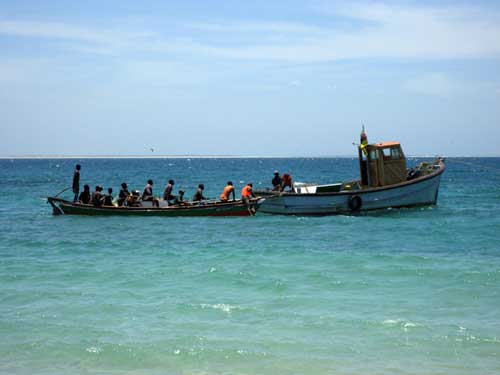
Nature Conservancy:
Piracy off the coast of Somalia may lack the romance of “Pirates of the Caribbean,” yet daily media reports still serve up a steady diet of adventure on the high seas — from rag-tag buccaneers wielding assault rifles and rocket launchers to captive sailors being rescued.
Some reports cite experts who trace today’s piracy to environmental causes. The first pirates, they say, originally were Somali fishermen who turned vigilante when their livelihoods were decimated by rampant toxic waste dumping and illegal fishing from foreign ships.
If nothing else, this point suggests layers of complexity that a mass of sensationalistic reporting routinely misses. One key issue that is barely being addressed is what will happen to Somalia’s marine environment, especially fisheries, as a consequence of this ongoing conflict.
To my mind, the two bottom-line questions are these:
Does the threat of piracy drive fishing elsewhere and, therefore, reduce pressure on the region’s fisheries?
Or does the piracy foster a lawless environment in which fisheries are wantonly plundered?
Two Nature Conservancy partnerships in eastern Africa — not to mention a wealth of historical lessons — suggest at least partial answers. In northern Kenya and in Mozambique, we know that a lack of security means greater peril to habitats and animals. That’s why our work in both places includes direct support to our partners’ security efforts.
Few places on Earth rival the richness of life you find in the rangelands of northern Kenya, where herds of elephant roam the savannas, along with endangered Grevy’s zebra and black rhino. Lack of security here leads to poaching, cattle raiding and tribal conflict over resources such as land, water, livestock and wildlife. Our local partners provide anti-poaching and law-enforcement patrols that both guard wildlife and bring peace and stability to communities.
In northern Mozambique, lack of security emboldens international trawlers that pillage no-fishing zones and poachers who rob eggs from turtle and sooty tern nests. Our work here includes supporting local communities’ efforts to control illegal and destructive fishing and poaching. Security, again, is central here to protecting some of Africa’s richest coral reefs and coastal habitats and ensuring sustainable fisheries.
If pirates were suddenly to appear in Mozambique, they would probably target commercial vessels and thus drastically reduce fishing pressure in the near term. The resulting security issues, however, would likely force us to reduce our investment — meaning no (or fewer) community fishing guards patrolling the waters. Even if we assume the pirates eventually would be vanquished, a conservation vacuum would remain and marine diversity could suffer indefinitely.
So while questions remain about the short-term vs. long-term consequences, it’s only logical that piracy will profoundly affect Somalia’s marine diversity. Some have said that security won’t return to the sea until a stable government returns to the land. And certainly any hopes we have for investing in conservation for the long haul and achieving ultimate goals such as sustainable fisheries depend on certain conditions. Chief among these are stable governance and some sense of law and order.
Still, does a period of insecurity deter, say, trawling and fishing enough to produce some benefit (however fleeting) to nature?
I can’t help but wonder.
Matt Brown is the director of conservation for The Nature Conservancy in Africa.
No comments:
Post a Comment